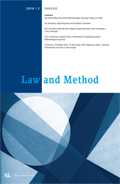|
Education should be aimed at supporting student learning. ICT may support student learning. It also may help students to learn and increase their involvement and thus their efforts. Blended learning has the potential to improve study behaviour of students, thus becoming an indispensable part of their education. It may improve their preparation level, and as a result, face-to-face education will be more efficient and more profound (e.g. by offering more challenging tasks), lifting the learning process to a higher level. Moreover, the interaction between students and teachers may be improved by using ICT. A necessary condition to lift students’ learning to a higher (better: deeper) learning level is that all students acquire basic knowledge before they engage in face-to-face teaching. In a First-Year Course Introduction to Private Law, we recently introduced a Scalable Learning environment. This environment allows the acquiring and testing of factual knowledge at individual pace, in a modern and appealing way (independent of time and place). The link between offline and online education during face-to-face teaching is made by using Learning Analytics, provided by the Scalable Learning environment. After the implementation of Scalable Learning, a survey on its effect on learning has been performed by means of questionnaires. The results were compared at the beginning and at the end of the course, related to the approaches taken by teachers as well as to the exam results. This article presents the outcomes of this study. |


Law and Method
About this journalSubscribe to the email alerts for this journal here to receive notifications when a new issue is at your disposal.
May, 2020
Expand all abstracts
| Artikel |
|
| Keywords | legal education, blended learning, Scholarship of Teaching and Learning, student learning |
| Authors | Mr.dr. Emanuel van Dongen and Dr. Femke Kirschner |
| AbstractAuthor's information |

 Issue 10
Issue 10